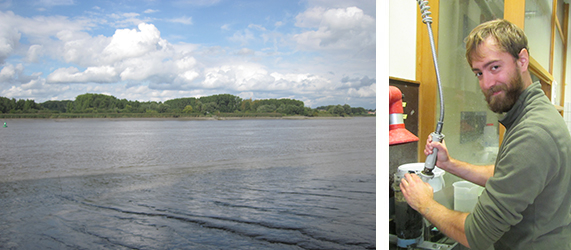I collected benthic communities in four consecutive seasons in a subtidal, high-dynamic intertidal, and low-dynamic intertidal habitat in the polyhaline, mesohaline, and oligohaline salinity zones of the Scheldt estuary. The sediment-water exchange of oxygen, nitrate, nitrite, ammonium and phosphate was measured, as well as abiotic properties of the sediment and water column, the particle reworking and bio-irrigation activity of the macrofauna community, and functional trait composition of the communities with respect to their sediment reworking capacity. Redundancy analysis and variation partitioning were used to quantify the relative contribution of the environment and the macrofauna to benthic biogeochemistry.
The role of macrobenthos to benthic biogeochemical cycling was found to be highly context dependent, with clear differences between different seasons or benthic habitats. These findings also suggest that environmental change, altering the functional composition of macrobenthos communities, can have profound impacts on the functioning of benthic ecosystems.
Sebastiaan Mestdagh is a postdoctoral researcher at the Department of Estuarine and Delta Systems, where he works on the Smartsediment project, evaluating sediment management measures in the Scheldt delta and studying their impact on ecosystem services. He completed his PhD at Ghent University in Belgium, entitled “Functional roles of benthic macrofauna in benthic biogeochemistry across natural and anthropogenic gradients” and supervised by Prof. Tom Moens, Dr. Carl Van Colen and Dr. Tom Ysebaert (NIOZ). This colloquium largely corresponds with the second chapter of his PhD thesis.
